7 ways that tabletop RPGs have helped my 3 year old kid and me
I started playing tabletop RPGs with my kid when he was about 2.5 years old. We started out with simple storytelling exercises where I would ask him questions about the character and adventure… and then we progressed into actual game systems.
As of writing this article, we’ve played about 8 tabletop RPGs systems together with a variety of mechanics, dice, concepts, and themes… and he is picking them up so well and growing with them! It’s also had a great positive impact on both my kid and me together.
Jump to:
- Curiosity, creativity, and problem solving
- Handling disappointment and consequences
- Practicing focus
- Speech development
- Counting and math
- Bonding
- Having fun!
- Overall
1. Roleplaying helps boost kid’s curiosity, creativity, and problem solving
When we first started playing tabletop RPGs, it really was me telling a story that I made up in place of our normal reading time, and then I would ask questions about what the main character should do.
We have progressed so far past this.
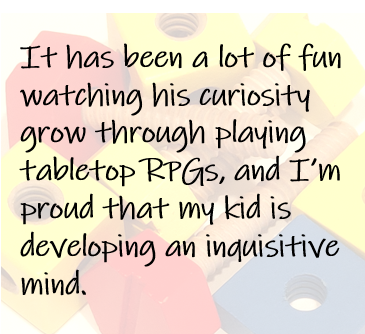
About 1 month in, my kid started suggesting other options for solving some of the problems in the game (other than what I presented him with). Now, he doesn’t need me to suggest solutions anymore. 90% of the time, he comes up with ideas on his own, and that’s carried over into life outside the game when trying to fix toys or ask question. This was a huge jump in both his problem solving and creativity skills that directly links to us role playing together.
He also started asking more questions about our game stories recently. He wanted to know details about some of the side characters or what was deeper in the forest or past one of the mountains, so… we explored it! It has been a lot of fun watching his curiosity grow through playing tabletop RPGs, and I’m proud that my kid is developing an inquisitive mind.
2. Games help kids learn how to handle disappointment and consequences
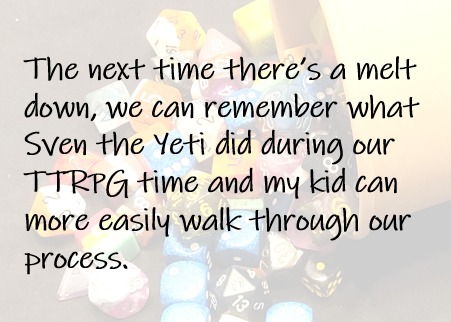
Another great aspect to tabletop RPGs is that it is a safe place for kids to work out techniques for handling hard points in life.
If I notice my kid is getting particularly frustrated with his blocks not working or is shoving his crayons down the air vent and getting upset when they are gone, I integrate parts of that into our next game and teach him coping strategies while he’s calm and having fun during play.
The character in the game maybe has a hard time climbing a mountain or gets upset when their toy sinks in a lake. We then walk through how the character can calm down using different skills (deep breathing, sing a calm down song, tap shoulders, etc) and then decide to either fix the problem or move on. The next time there’s a melt down, we can remember what Sven the Yeti did during our TTRPG time and my kid can more easily walk through our process.
The number of meltdowns went down significantly about a week into incorporating these elements into our tabletop games, and when my kid does have a meltdown now, they are a lot shorter. This was not just a huge relief for me as the parent, but I’m also confident that he’ll be able to continue building on these coping strategies as he gets older.
3. Tabletop RPGs help kids to practice focus
When we first started playing tabletop RPGs together, we could maybe go for about 5 minutes before my kid would got distracted and wanted to try something else.
Recently, my kid literally sat and played TTRPG-time with me for 1.5-2hrs and was super disappointed when we had to stop to make dinner. That is my toddler staying engaged for hours.

I know that him just growing up is a big factor, but this was such a huge shift, I have to imagine there was some impact from playing tabletop RPGs with him too. He now will play pretend either with me or on his own for extended periods of time versus jumping from toy to toy, and he is a lot calmer during that time.
4. Roleplaying helps kids with speech development
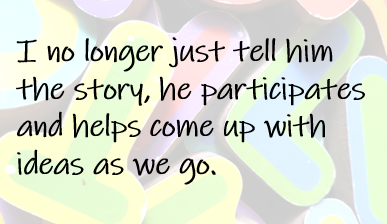
Because of our tabletop RPG time, my kid and I have spent at least 30 minutes a day for the past few months just talking to each other, making stories, and asking questions. And it really is talking with each other now – I no longer just tell him the story, he participates and helps come up with ideas as we go.
I know that there’s expected to be speech progression with toddlers pretty quickly in some cases, but within 6 months, he went from talking in understandable but choppy short sentences to now busting out clear 10+ word grammatically correct sentences at the dinner table (so it isn’t just when we’re playing games). Our game and focused talking time each day really helped him practice his speech skills and gain confidence while communicating as well.
5. Tabletop games help kids practice counting and math
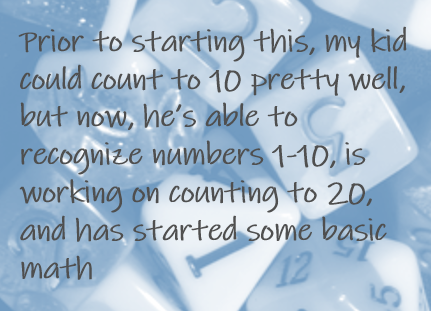
Most of the tabletop RPG systems we tried out involved some kind of randomization or dice mechanics and number tracking. Prior to starting this, my kid could count to 10 pretty well, but now, he’s able to recognize numbers 1-10, is working on counting to 20, and has started some basic math (learning greater than/less than and adding/subtracting small numbers).
I introduced some tracking tools (see previous article) to our games help my kid with quantifying numbers more easily, and they really helped him make the connection between the numbers and what they mean. He is also much more willing to practice counting and “numbers learning time” when we replace it with tabletop RPG time – this really has been learning through play, and it works so well.
6. Tabletop RPGs helped my kid and me share a bonding experience
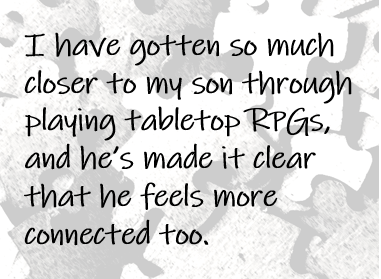
I have gotten so much closer to my son through playing tabletop RPGs, and he’s made it clear that he feels more connected too. He gets so excited recounting our stories with me and is much more comfortable asking for help or wanting to play. One of the sessions even ended with him giving a big earnest hug and an, “I love you mommy” before he dashed off to go play the next thing (and I started crying).
I feel like we’ve gotten to know each other a lot better and see each other through playing these games together, and it significantly helped me carve out some time to just be together and form that bond each day.
7. Tabletop RPGs are just fun for everyone!
My kid has SO MUCH fun playing tabletop RPGs, and I believe that having fun (at any stage in life, but especially for kids) is important to being a healthy person.
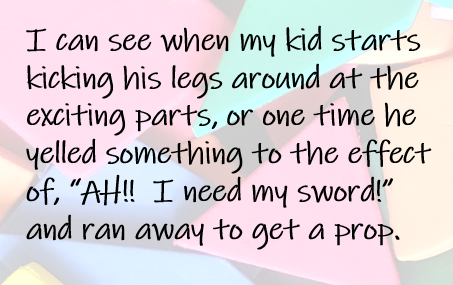
I can see when my kid starts kicking his legs around at the exciting parts, or one time he yelled something to the effect of, “AH!! I need my sword!” and ran away to get a prop. Other times, he’ll laugh at my funny character voices or start making up silly words and character names, giving himself giggle fits.
I feel like kids can definitely have fun on their own too by just naturally being who they are, but… tabletop RPGs gives an opportunity for me to be there and engage with him during game time and start to imprint on him that it is OK to have fun as an adult. It also gives me a chance to provide something for him that brings us both some fun during the day.
My overall take-aways from playing tabletop RPGs with my 3 year old:

Playing tabletop RPGs with my kid has been a rewarding experience for both of us. I feel like he’s grown in both soft and hard skills because of this. I’ve also been able to use it as an integrated teaching method with my kid, and it’s a consistent metric for seeing how he’s growing so I can adjust and keep up with him. Playing tabletop RPGs together has also helped us to grow closer and bond over something special that we now share.
I really hope you found this article and our experiences helpful and, if you were considering starting tabletop RPGs with your kids, that this assists you in making that choice!
Please let me know in the comments if you have any questions or if this post helped, and make sure to subscribe to the TTRPGkids monthly newsletter to stay up to date on the latest reviews, tips and tricks, game and podcast list updates, and more! Thank you for playing tabletop RPGs with your kids and sharing this awesome hobby with the next generation!
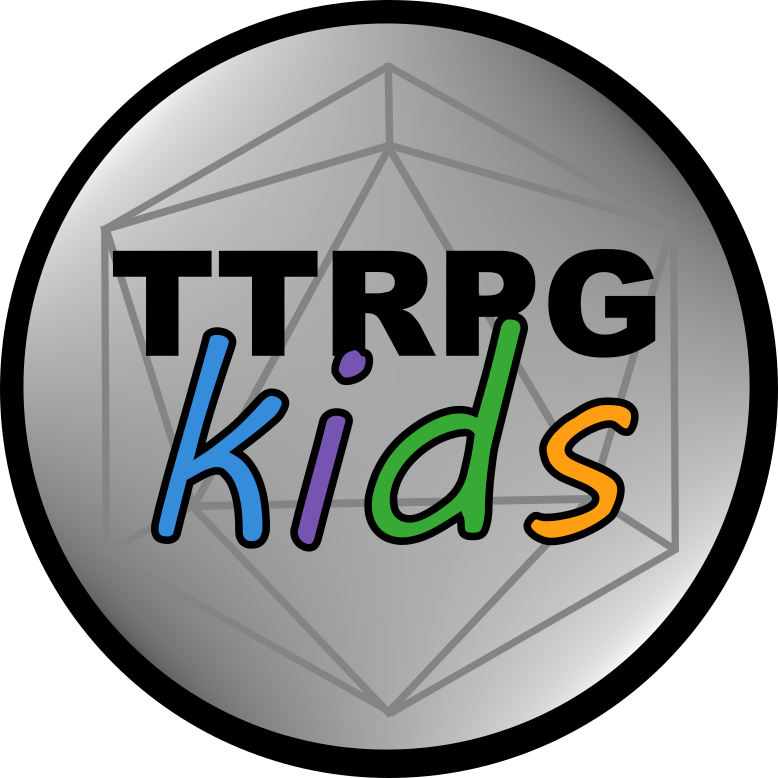
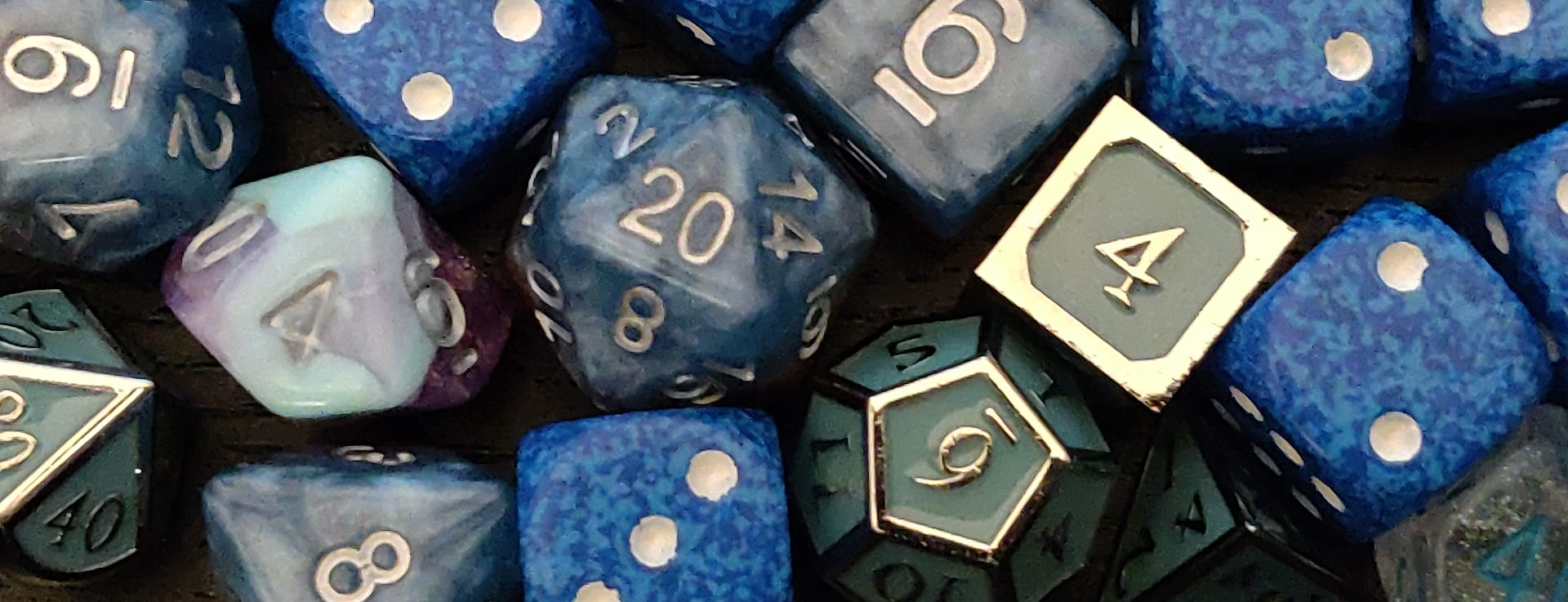

One other issue issue is that video games usually are serious naturally with the key focus on mastering rather than fun. Although, there’s an entertainment feature to keep your young ones engaged, just about every game is generally designed to work on a specific group of skills or course, such as mathmatical or scientific discipline. Thanks for your publication.
That’s why I like TTRPGs so much – while some TTRPGs are aimed at mastery, there’s A LOT of them that are just fun and naturally have a lot of benefits baked in. I think having fun is one of the best ways to learn, and I’ve seen kiddo grow and learn more in the fun moments than in the super focused mastery moments.